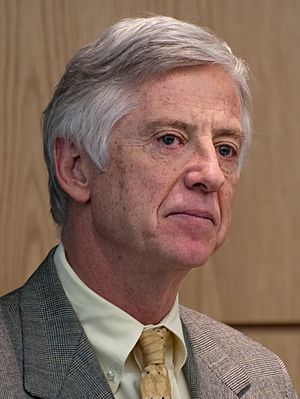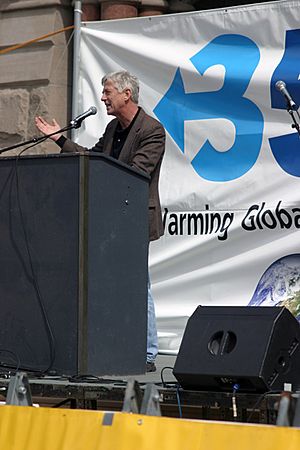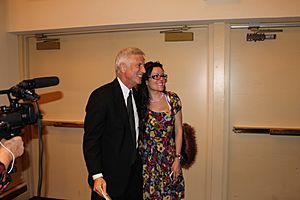Rocky Anderson facts for kids
Quick facts for kids
Rocky Anderson
|
|
|---|---|

Anderson in 2009
|
|
| 33rd Mayor of Salt Lake City | |
| In office January 3, 2000 – January 7, 2008 |
|
| Preceded by | Deedee Corradini |
| Succeeded by | Ralph Becker |
| Personal details | |
| Born |
Ross Carl Anderson II
September 9, 1951 Logan, Utah, U.S. |
| Political party | Democratic (before 2012, 2022–present) Justice (2012–2022) |
| Residences | Salt Lake City, Utah, U.S. |
| Education | University of Utah (BA) George Washington University (JD) |
Ross Carl "Rocky" Anderson II (born September 9, 1951) is an American lawyer and activist who is known for his work on civil and human rights. He served two terms as the 33rd mayor of Salt Lake City, Utah, from 2000 to 2008.
Before becoming mayor, Anderson was a lawyer for 21 years. He also ran for the U.S. Congress in 1996. After his time as mayor, he started a group called High Road for Human Rights. He also ran for president in 2012 with the Justice Party. In 2023, he ran for mayor of Salt Lake City again but did not win.
Contents
Early Life and Education
Rocky Anderson was born in Logan, Utah. His family owned a lumber company that was started by his great-grandfather, who came from Norway.
Anderson was raised in the Church of Jesus Christ of Latter-day Saints (LDS Church). As he grew up, he began to disagree with some of the church's rules. He believed that everyone should be treated fairly, no matter their race or background. He also supported the rights of the LGBTQ+ community. He felt it was important for people to follow their own conscience and make their own moral decisions.
In high school, Anderson played guitar in a rock band called the Viscounts. He later went to the University of Utah, where he studied philosophy and graduated with high honors. He worked many different jobs, including truck driver, roofer, and cab driver. After college, he traveled in Europe before deciding to go to law school. In 1978, he earned his law degree from George Washington University Law School.
Career as a Lawyer and Activist
Helping People Through Law
After law school, Anderson returned to Salt Lake City and became a lawyer. For 21 years, he represented people in many important cases. He often helped individuals who were suing large companies or government groups. His work focused on civil rights, making sure people were treated fairly, and protecting people's freedoms under the Constitution.
Anderson also worked to improve Utah's laws about child custody. He helped start a program to give legal help to people who could not afford a lawyer. He was a leader in the Utah State Bar Association and was president of his law firm.
Working for a Better Community
While practicing law, Anderson volunteered for many non-profit groups. He worked with organizations that protected civil rights, supported education for children, and tried to improve the justice system. He was the president of the ACLU of Utah and other community groups.
Anderson also spoke out against U.S. government actions in Latin America during the 1980s. He organized trips to Nicaragua so that people from Utah could see what was happening there for themselves.
Political Career
1996 Campaign for Congress
In 1996, Anderson ran for the U.S. Congress as the Democratic candidate for Utah's 2nd congressional district. He was seen as very liberal by some because of his support for civil rights and his opposition to the death penalty. He lost the election to his Republican opponent, Merrill Cook, but still received over 100,000 votes.
Mayor of Salt Lake City
Anderson was elected mayor of Salt Lake City in 1999 with 60% of the vote. He was re-elected in 2003. As mayor, he was involved in many important projects and became known for his leadership on environmental issues and human rights.
Hosting the 2002 Winter Olympics
One of Anderson's biggest challenges as mayor was helping to host the 2002 Winter Olympics. He worked closely with Mitt Romney, the head of the Salt Lake Organizing Committee, to make sure the games were safe and successful. Romney later praised Anderson for his key role in getting the needed funding for public safety.
Protecting the Environment
Anderson was known as one of the "greenest" mayors in the United States. He started the Salt Lake City Green Program to make the city more sustainable. Under this program, the city reduced its greenhouse gas emissions by 31% in just three years. This was done by using energy-efficient vehicles, improving city buildings, and promoting recycling.
In 2002, he committed Salt Lake City to the goals of the Kyoto Protocol, an international agreement to fight climate change. The city met these goals in 2006, seven years early. For his work, Anderson received awards from the Environmental Protection Agency and the Sierra Club.
Improving the Justice System
Anderson made several changes to Salt Lake City's criminal justice system. He ended the city's use of the DARE program in schools after studies showed it was not effective. Instead, he supported other programs that had been proven to work.
He also created restorative justice programs. These programs sent some offenders to counseling and treatment instead of to jail. This approach helped people get their lives back on track and cost less than the traditional system.
Supporting All Communities
Anderson worked to make sure that people from all backgrounds were included in city government. He signed an order in 2000 to create an affirmative action program for city hiring. This led to a large increase in the number of employees from ethnic minority communities.
He also supported immigrants and their families. After a raid at the Salt Lake City Airport where undocumented workers were arrested, he created the Family to Family program. This allowed local families to help the workers and their families directly.
Later Career and Advocacy
Fighting for Human Rights
After two terms as mayor, Anderson decided not to run again. Instead, he wanted to focus on human rights issues. In 2008, he started a non-profit group called High Road for Human Rights. The group's goal was to encourage regular people to push elected officials to act on important issues like torture, genocide, and the climate crisis.
For his work, Anderson received several awards, including the Morehouse University Gandhi, King, Ikeda Award.
2012 Presidential Campaign
In 2011, Anderson announced he was leaving the Democratic Party. He felt the party was not doing enough to stand up for its principles. He then helped create a new political party called the Justice Party.
In 2012, he ran for president as the Justice Party's nominee. His running mate was activist and writer Luis J. Rodriguez. Anderson appeared on the ballot in several states and received over 43,000 votes.
Personal Life
Anderson has said that his Mormon upbringing taught him important moral lessons. However, he has also spoken out against what he sees as discrimination in the LDS Church. He appeared in the movies 8: The Mormon Proposition and "Quiet Heroes," which deal with these topics.
Anderson has one son. He lives in Salt Lake City with his dog, Franklin, and his parrot, Cardozo.
Images for kids
 | Janet Taylor Pickett |
 | Synthia Saint James |
 | Howardena Pindell |
 | Faith Ringgold |




